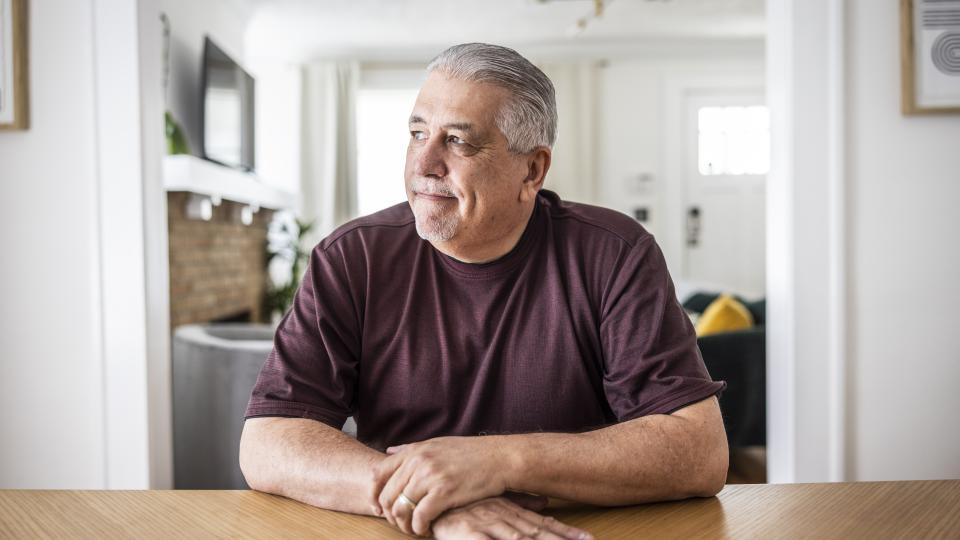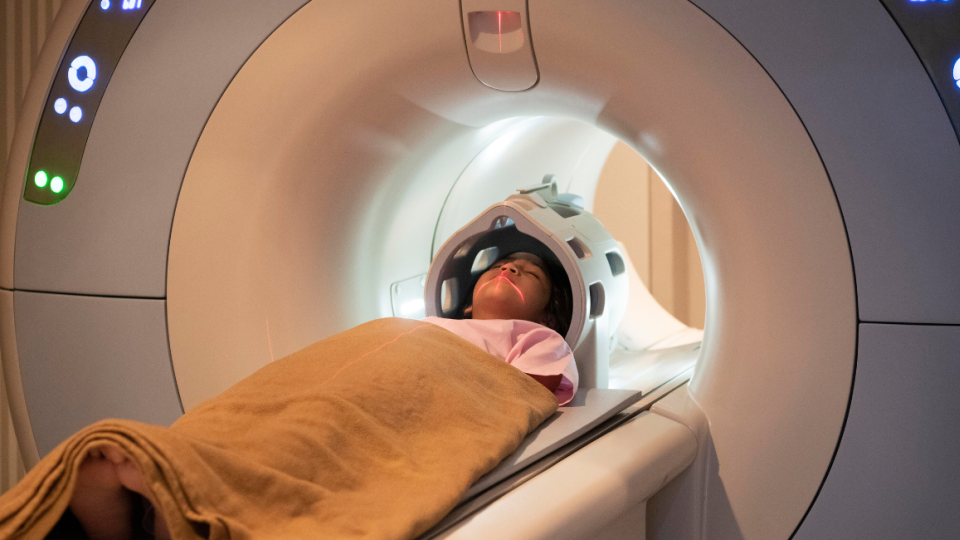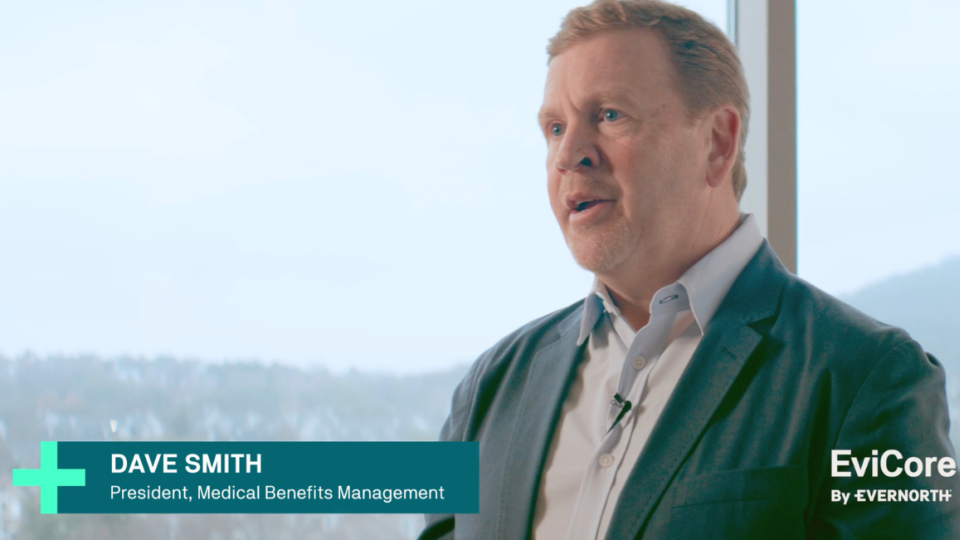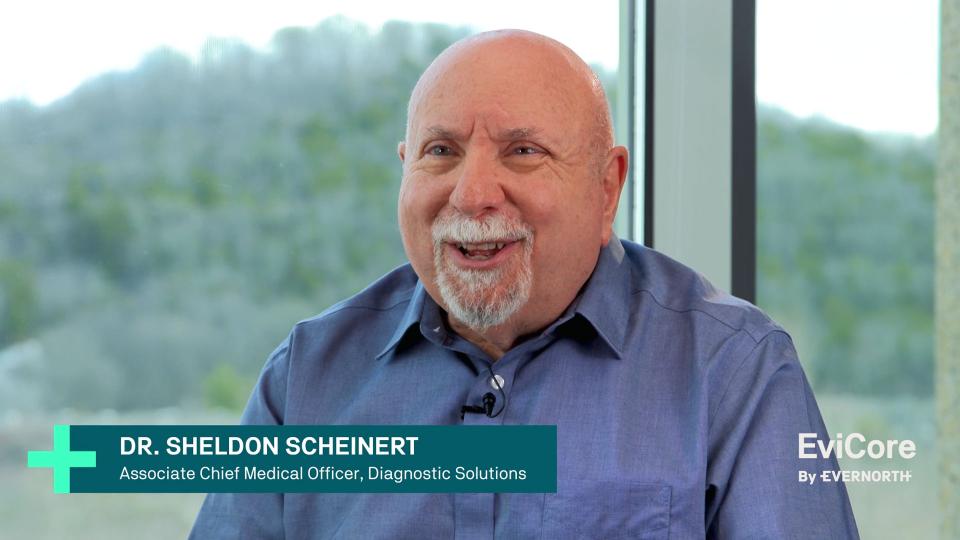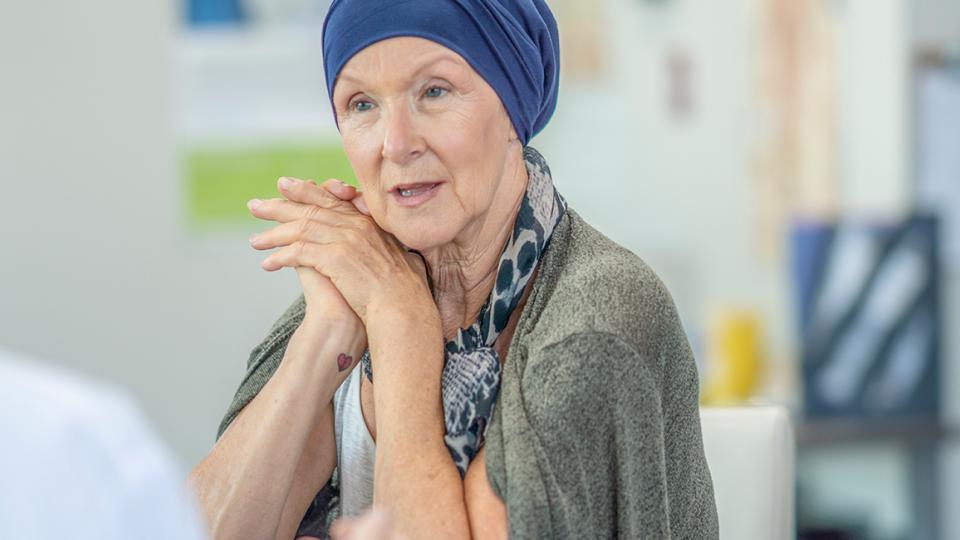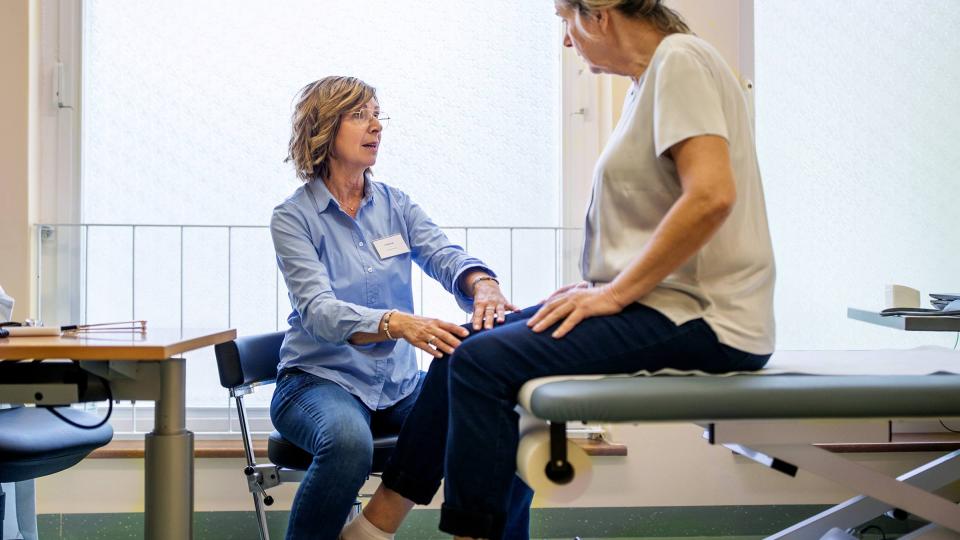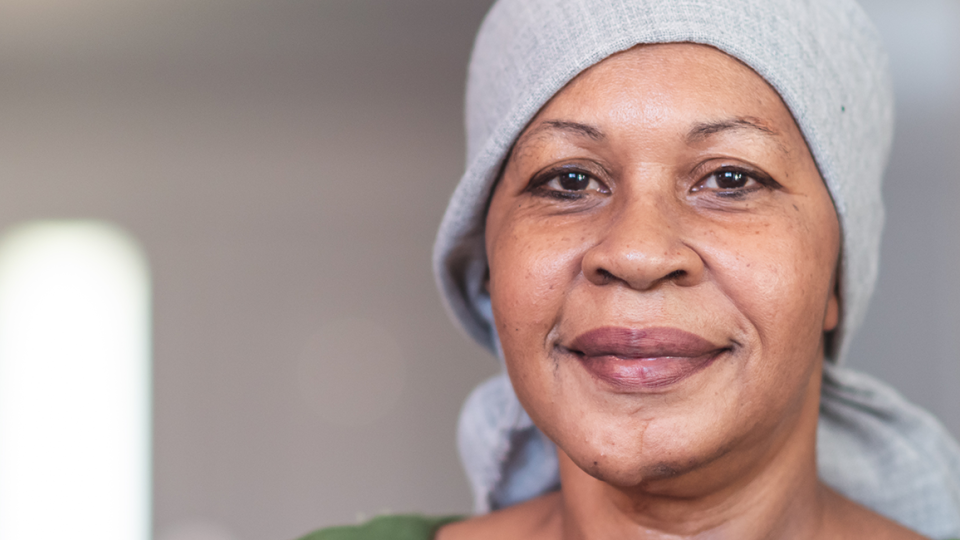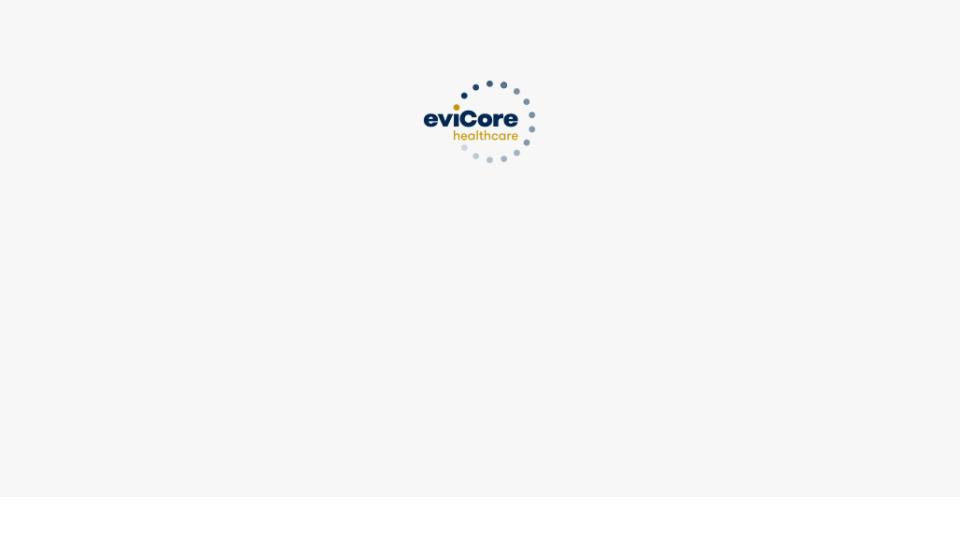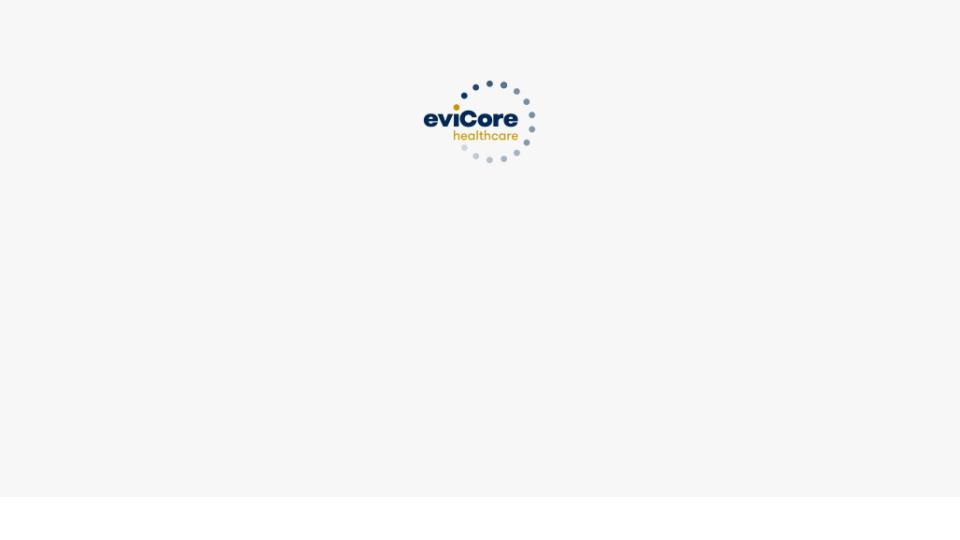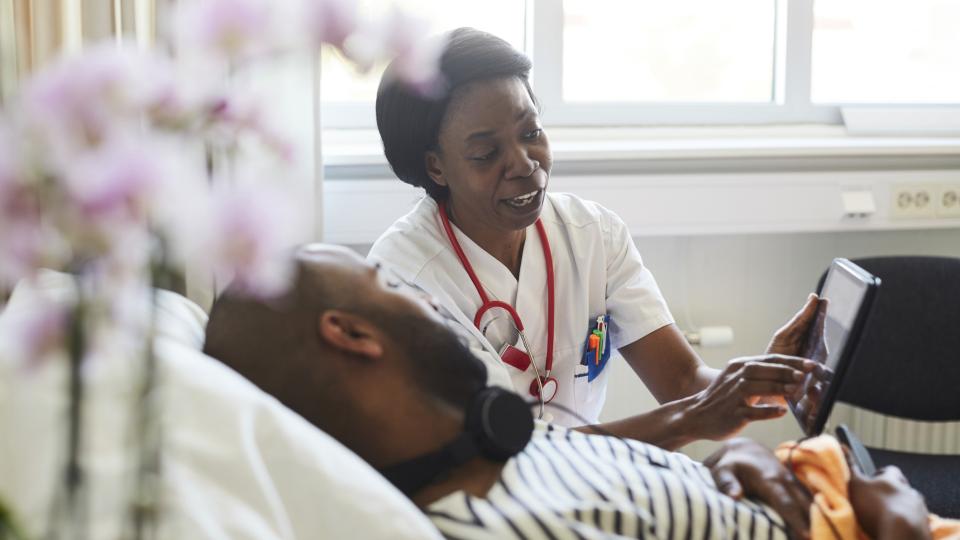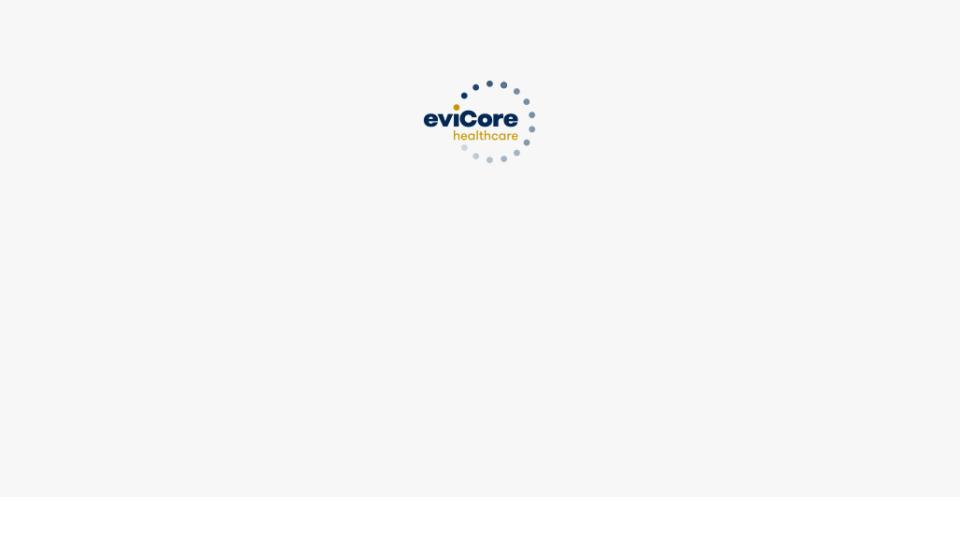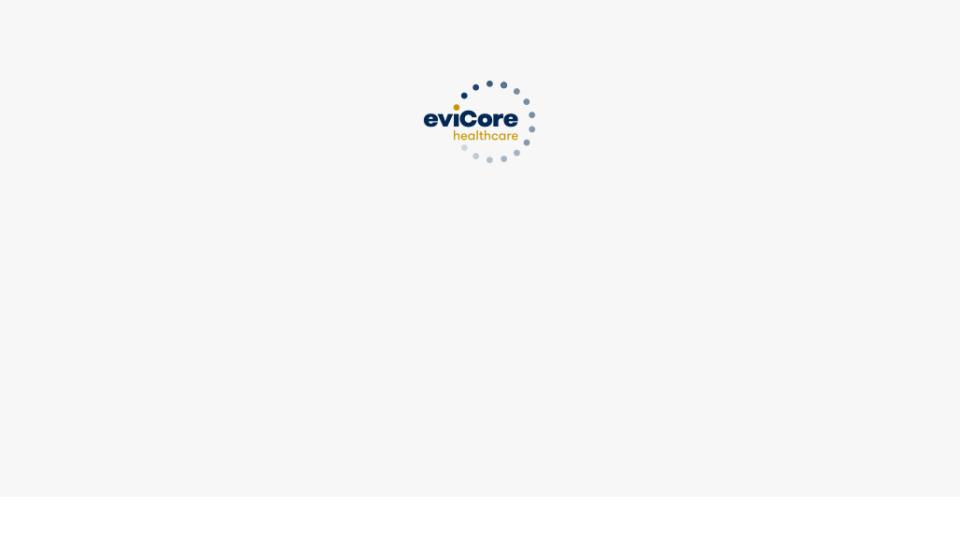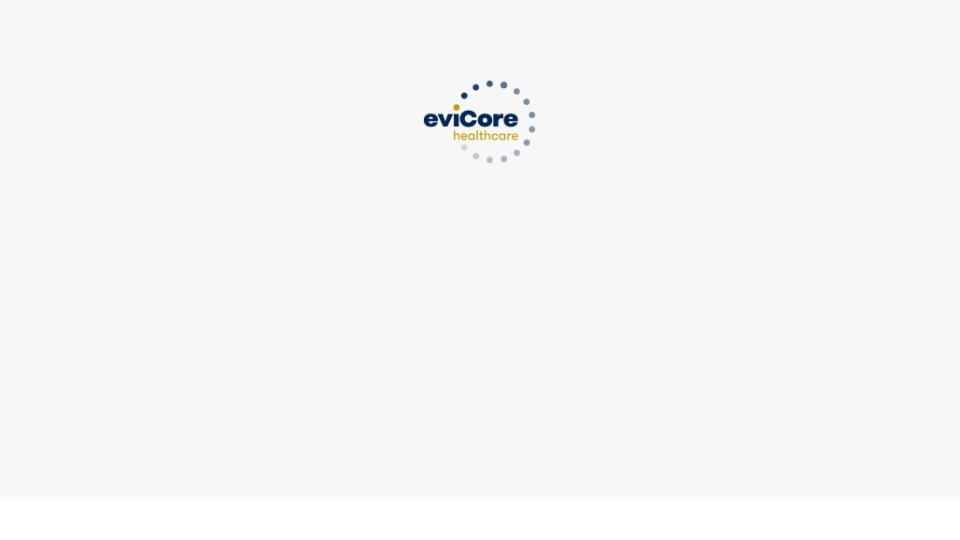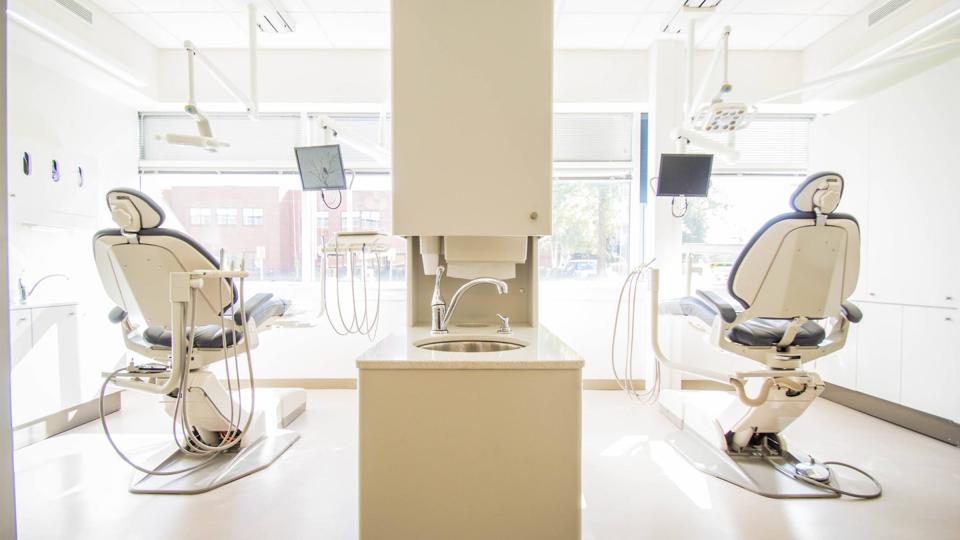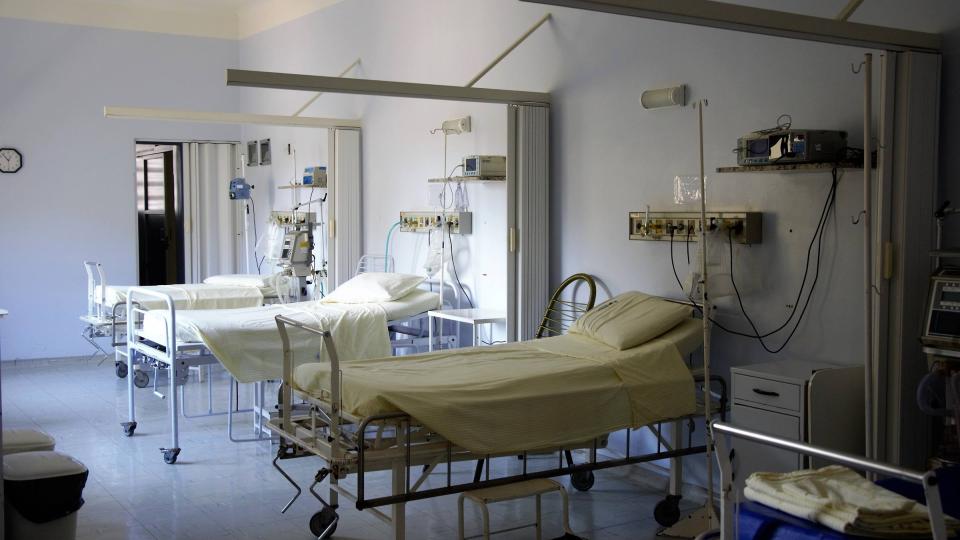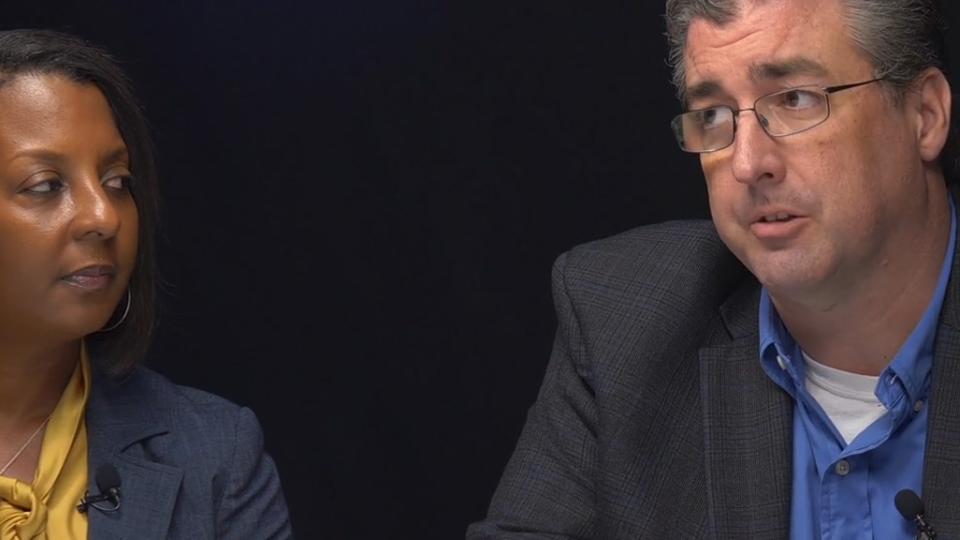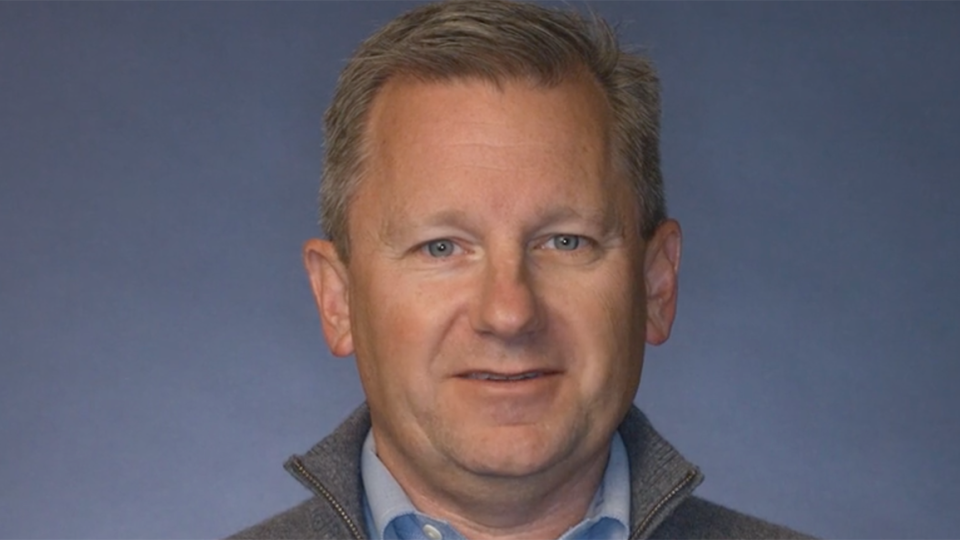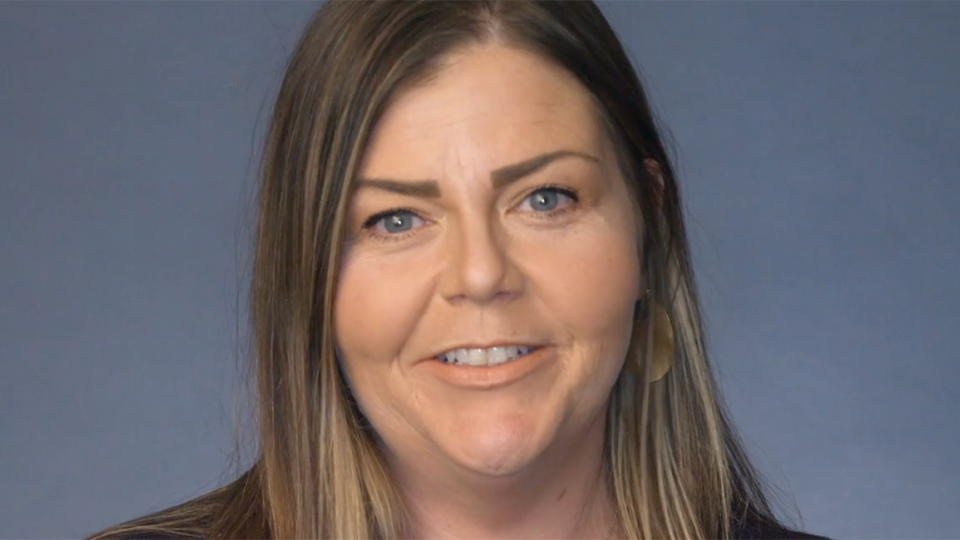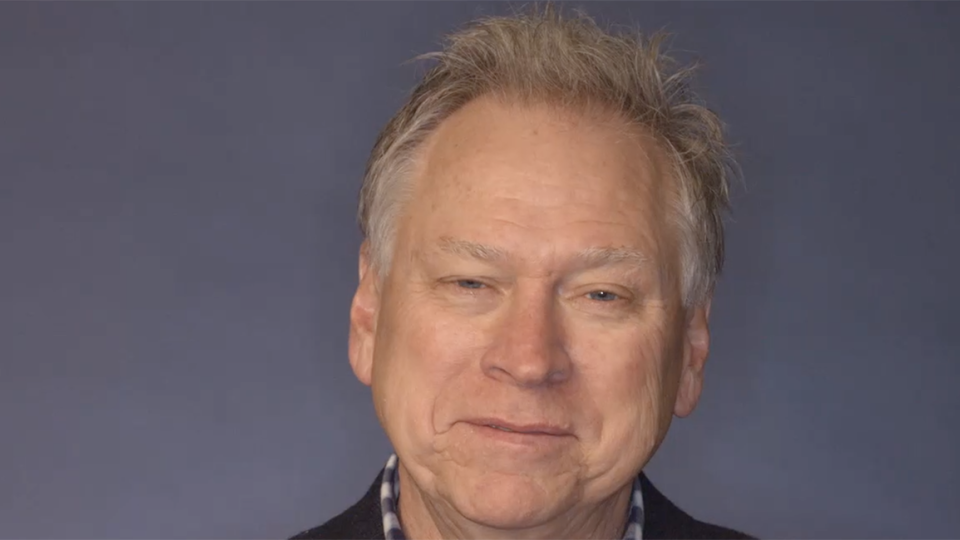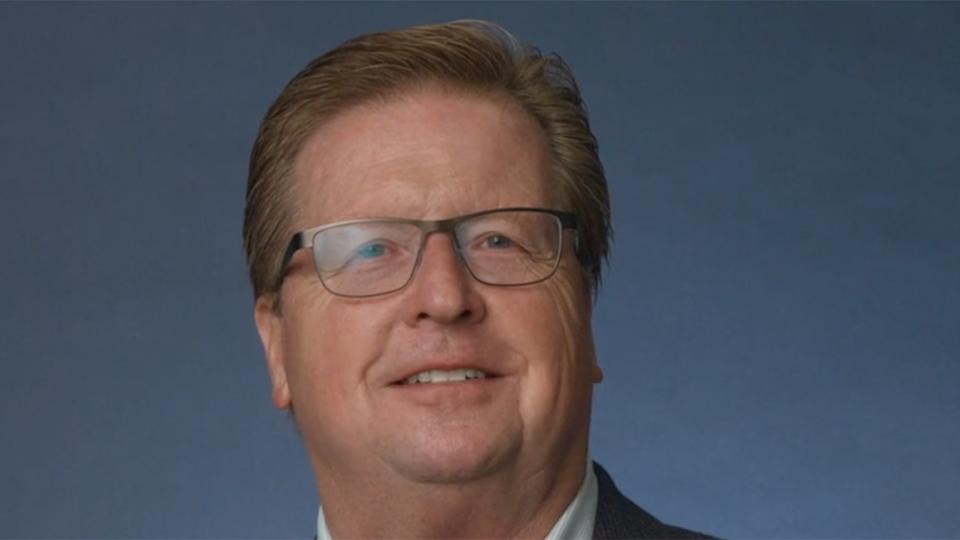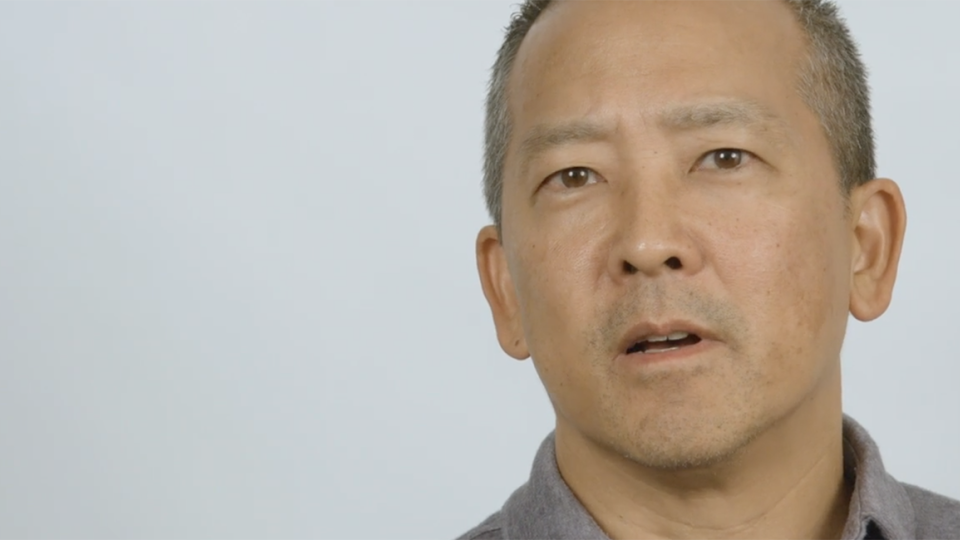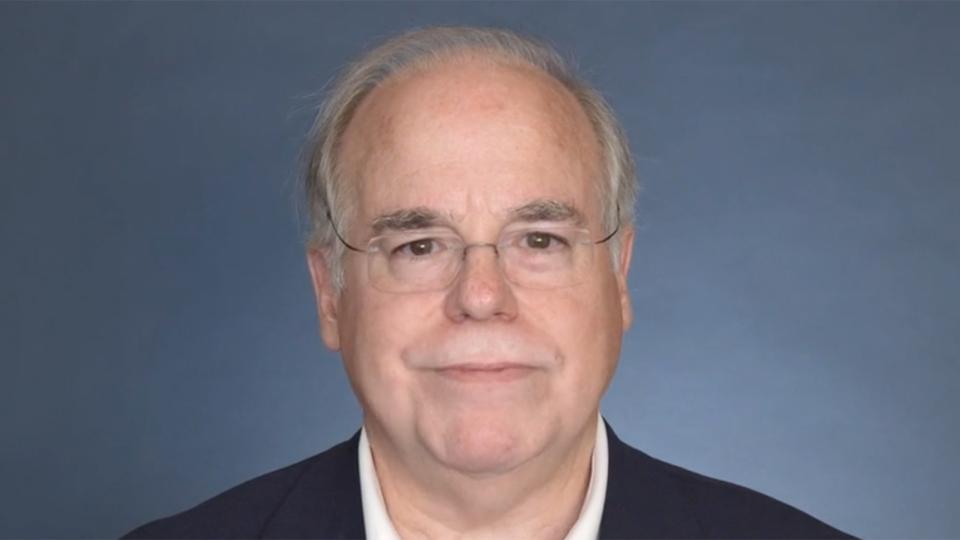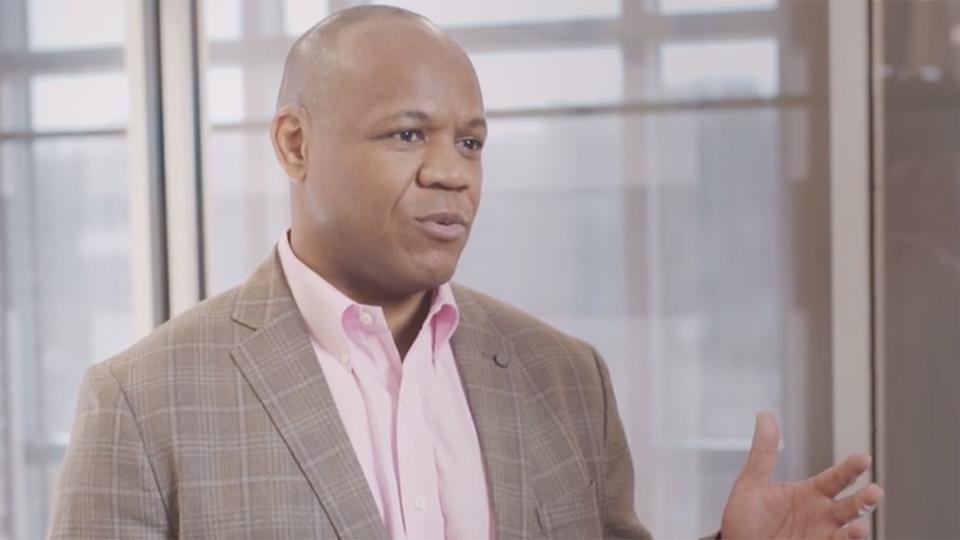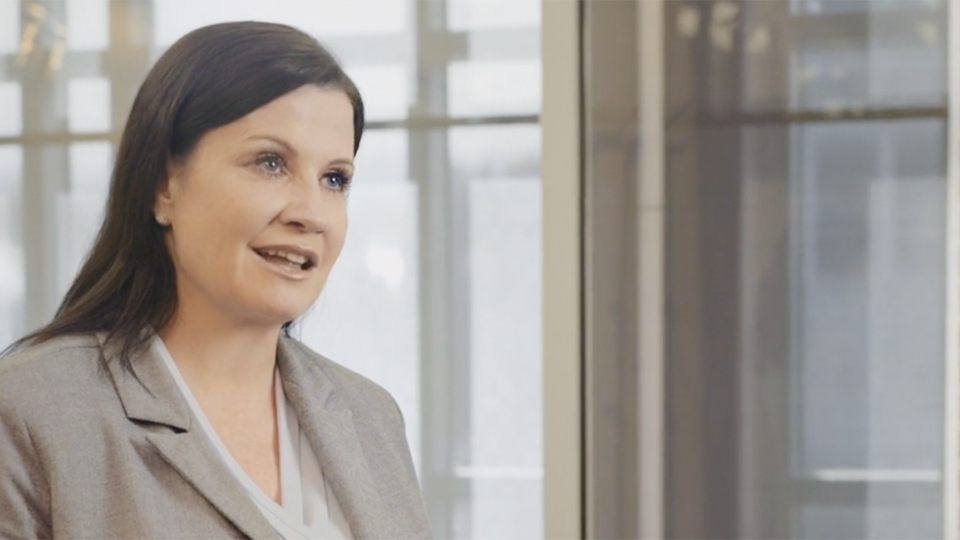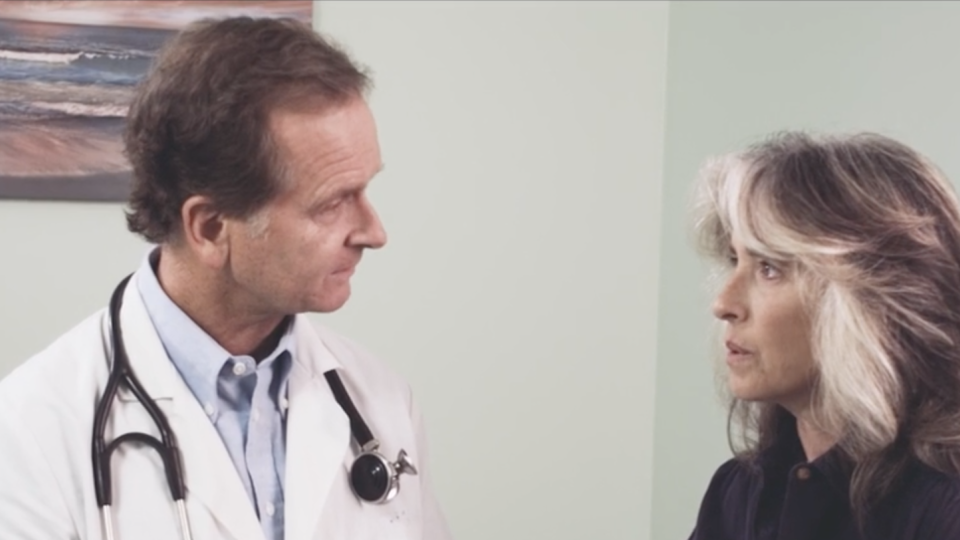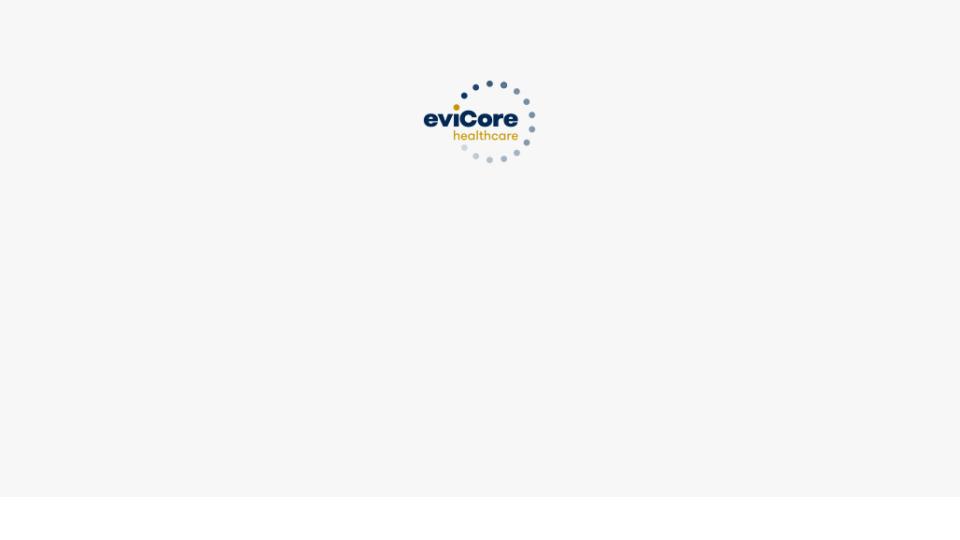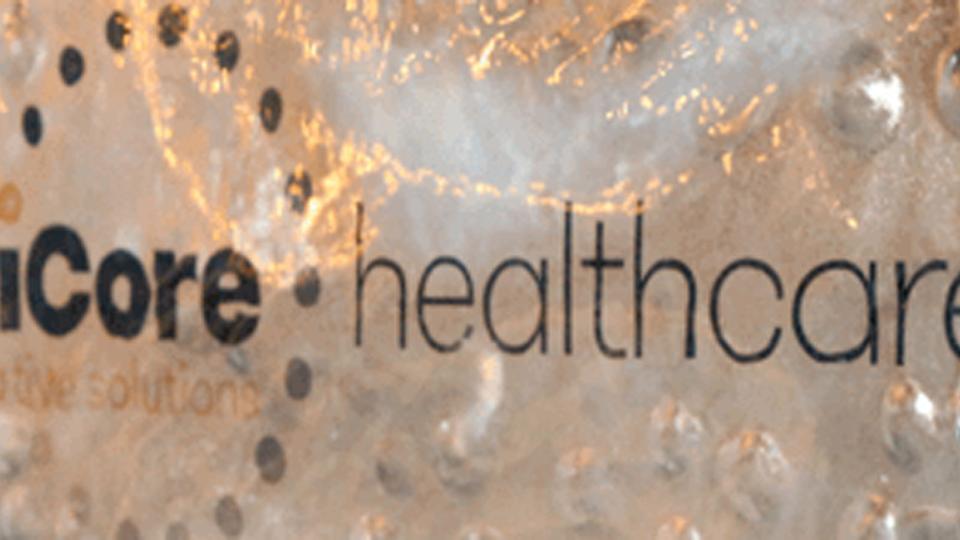Improving Member Access and Affordability Through Smarter Sites of Care
EviCore by Evernorth is helping make health care more affordable and accessible by guiding members to high-quality, in-network, and cost-effective care locations. Through personalized support programs like SmartChoice and Site of Care, members receive help navigating options, scheduling appointments, and reducing out-of-pocket costs—leading to better experiences, improved outcomes, and over $130 million in annual savings.
WATCH: Helping Providers Connect to the Latest Evidence-Based Oncology Care
Connecting providers with the latest scientific evidence can help them deliver high-quality patient care with minimal administrative burden.
Getting to “Yes” faster with prior authorization
EviCore by Evernorth® is working to continuously improve the utilization management solutions we offer today and transform the solutions we’ll offer tomorrow. Reducing the administrative burden for providers is a major focus of our efforts with intelliPath.
Digital Experience: Top 3 Most Common Cancer Types
There are over 100 different types of known cancers, and out of those, three types are the most common in men and women. We've compiled information on symptoms, helpful tips, and stats on clinical trials on the most common types of cancer.
All Insights
EviCore by Evernorth is helping make health care more affordable and accessible by guiding members to high-quality, in-network, and cost-effective care locations. Through personalized support programs like SmartChoice and Site of Care, members receive help navigating options, scheduling appointments, and reducing out-of-pocket costs—leading to better experiences, improved outcomes, and over $130 million in annual savings.
Connecting providers with the latest scientific evidence can help them deliver high-quality patient care with minimal administrative burden. Through partnerships between oncologists and Evicore by Evernorth, we have helped save cancer patients over 64,000 days of unnecessary radiation.
The need for supportive clinical partnership and streamlined processes to get patients the right care quicker has never been more critical. That’s why there is continuous work being done to improve utilization management.
There are over 100 different types of known cancers, and out of those, three types are the most common in men and women. We've compiled information on symptoms, helpful tips, and stats on clinical trials on the most common types of cancer.
Mary* is a 60-year-old patient who has been experiencing balance issues. She has fallen several times. Her doctor identifies an abnormal walking pattern. Learn more and click through Mary's journey.
Utilization management (UM) works to ensure that the right health care service is being issued to the right patient at the right time, with the least possible burden for patients and providers. This is not without challenges on the providers' end. Challenges like outdated manual processes, paperwork, and confusion on benefit packages. With recent regulations and legislation, there have been many advancements in the UM space but our work isn't done.
Today’s complex, fragmented health care system doesn’t always meet individual care needs. It can also be burdensome for providers and often costs more than it should.
There may not be a more misunderstood part of the health care system than utilization management (UM). UM helps ensure that members receive health care services that are appropriate, necessary, and cost-effective.
Leveraging evidence and expertise to improve the safety and cost of PVD care.
60-year-old Don*, who was in a motor vehicle accident a little over a year ago, is still suffering from persistent back pain. Learn how EviCore helped both Don and his provider leverage clinical expertise through EviCore's utilization management.
Unnecessary, potentially dangerous peripheral vascular interventions highlight the need for evidence-based care.
Creating better outcomes and experiences with a personalized concierge approach.
From savings to plan performance, uncover the power of Radiology Site of Care management.
The Centers for Medicare & Medicaid Services (CMS) recently released its Advancing Interoperability and Improving Prior Authorization Processes final rule. We sat down with Chief Medical Officer Eric Gratias, M.D., to talk about how well prepared EviCore by Evernorth® is for the rule and what it means for patients, providers and payers.
Did you know laboratory tests influence two-thirds of clinical decisions? While the right tests enable better diagnoses and treatment, the wrong ones can often do more harm than good.
Explore our interactive infographic to learn how this proven program is driving provider adoption of high-quality oncology treatment regimens to improve patient health outcomes and lower drug costs.
The fact that 25%–40% of musculoskeletal (MSK) care spending is wasteful or ineffective is concerning enough. But coupled with the knowledge that more than 50% of U.S. adults over 18 live with an MSK condition, the potential impact of low-value MSK care is staggering.
Our solution: An evidence-based care approach to diagnostic care.
See how EviCore helped a 50-year-old patient diagnosed with Barrett’s, avoid an unnecessary surveillance upper GI endoscopy.
Hear from EviCore President David Smith and the medical leadership team about the patient-centric benefits of EviCore’s evidence-based approach.
Alice* is a 50-year-old woman experiencing leg pain from a pinched nerve in her back.
While there are situations when hospital care is necessary, alternative sites like ambulatory surgery centers, freestanding imaging centers, and clinics are often the smarter choice.
Meet Renee, a 47-year-old office manager and married mother of two, and an EviCore patient whose life has been impacted by many of EviCore's solutions
Meet Jacob*, a 61-year-old man who received a diagnosis of stage III non-small-cell lung cancer last year. EviCore approved an evidence-based treatment that included chemotherapy and radiation therapy at a community cancer center. Jacob experienced an excellent response to treatment
Hear from Dr. Sheldon Scheinert, EviCore’s Associate Chief Medical Officer of Diagnostic Solutions, about how our program urges patients to get the colorectal cancer screenings they need.
Preventive Care Outreach: Partnering to Improve Health Outcomes, Lower Costs and Increase CMS Scores
Three-quarters of health care spending in the United States is due to avoidable chronic disease. Preventive care is one of the best ways to address this challenge; however, millions of Americans avoid preventive care every year.
Q&A from EviCore’s Dr. Lon Castle on Evidence-Based Lab Testing’s Ability to Improve Patient Outcomes & Reduce Costs
EviCore’s Dr. Robert Westergan on Managing Site of Care and Implants for Musculoskeletal Conditions in EviCore's newest insight for our MSK solution.
EviCore sat down with Dr. Sharon Nichols, a board-certified cardiologist, to understand how her team helps patients get evidence-based cardiovascular care to meet their needs.
Medical knowledge is growing at an unprecedented rate, which is accelerating every year. This information explosion has created a challenging environment for providers.
EviCore is working hard to reduce the time commitment of prior authorization through Evicore intelliPath®, our solution to help automate providers’ interactions with us. We sat down with EviCore’s Vice President of Strategic Development, Jim Knickle, to learn more.
We sat down with EviCore’s Associate CMO for Oncology Programs, to talk about his team’s efforts to make sure patients get cancer care that’s aligned with the latest medical science.
Q&A: EviCore’s Chief of Musculoskeletal Programs on the Need for Evidence-Based Care for Muscles, Bones and Joints.
No matter your role in healthcare, you're likely aware of prior authorization (PA). While some providers and patients find PA time-consuming and frustrating, it remains the best way to help ensure patients receive safe, appropriate and effective care at the lowest overall cost to U.S. healthcare. Recent advances in technology are making PA smarter, more automated and faster than ever before.
We sat down with Dr. Sheldon L. Scheinert, MD, FACG, Associate Chief Medical Officer of Diagnostic Solutions for EviCore. Dr. Sheldon L. Scheinert's job is to make sure patients get imaging tests like MRIs and CTs that are aligned with the latest medical science.
The Journal of Clinical Pathways has published a peer-reviewed study written by our EviCore oncology subject matter experts: “Improving Biosimilar Adoption Rates and Affordability With Oncology Pathways.”
The Increased Adherence to Molecular Profiling Recommendations in Non-Small Cell Lung Cancer (NSCLC) Through Use of Prior Authorization and Peer Review
The cost of cardiovascular disease goes beyond mortality and human suffering. Heart disease costs the United States more than $363 billion annually. Not all of the cardiovascular healthcare spending, however, is effective. In a recently released scientific statement, the American Heart Association notes that low-value cardiovascular care accounts for as much as 30 percent of this healthcare cost, meaning that over $100 billion is spent annually on care that does not improve the patient’s cardiovascular health.
Due to the current shortage of CT contrast, EviCore medical reviewers are following guidance regarding the appropriate alternative imaging studies, according to our evidence-based clinical guidelines for individual case scenarios.
While some newer approaches in the complex field of radiation oncology are still lacking sufficient evidence around efficacy, there is a type of radiation therapy—hypofractionation—that has proven to be highly effective and valuable for two of the most common cancers among women and men: breast cancer and prostate cancer.
Recent advances in radiation oncology treatments offer promising alternatives for the nearly 2 million patients diagnosed with cancer in the U.S. each year. One of these treatments is stereotactic body radiation therapy (SBRT). Also known as stereotactic ablative body radiation (SABR), this type of radiation was first used in the early 1990s.
One in seven women diagnosed with breast cancer is “overdiagnosed,” according to a new study published in the Annals of Internal Medicine. That means they were diagnosed with tumors that would’ve caused less harm if they’d remained hidden.
Learn more about the field of radiation oncology and how evidence-based guidelines enhance patient-centered care from Dr. Nimi Tuamokumo, EviCore Senior Medical Director and Radiation Oncologist.
Watch our February 15th webinar with Margaret Rausa, EviCore’s Vice President, Oncology Strategy and Growth, and Dr. Rajanish Singla, EviCore’s Chief of Radiation Oncology, who will provide an overview of Radiation Oncology for health plan representatives.
U.S. families are drowning in healthcare costs. The median U.S. household spends approximately 20% of disposable income on healthcare, with a projection of $6,832 in yearly premiums and $3,306 on out-of-pocket costs such as deductibles, copays, and coinsurance in 2022. Hospital costs alone have risen 600% since 1990.
Welcome to the final 2021 edition of our Ask EviCore feature! In this month’s edition, we’re sharing a list of resources to help you navigate the prior authorization process so you can provide the best, medically appropriate care to your patients.
Learn more about the work EviCore's Advanced Analytics R&D team does to support the business with a spotlight on an analysis on conservative therapy for low back pain.
Here are a few ways you can prepare for the holiday, including four exercises for low back pain you can try at home.
Listen on-demand for the insights of Miriam Sznycer-Taub, Director with Advisory Board’s Ecosystem Research team. She will discuss the rising popularity of home-based care and what that likely portends for the future of our healthcare system.
Choosing a home care provider is one of the hardest decisions family caregivers make. Preparing your populations with quality vetting questions can help them feel more empowered about making the best choices for their family.
By providing care in a setting that is comfortable for patients, helpful for providers, and affordable for payers, home health services help improve outcomes and reduce costs. Learn more about the benefits of quality in-home healthcare.
In-home healthcare is a way of extending provider support to the place where patients spend the bulk of their time. Here are four ways to engage home health services for better outcomes and more informed care during in-person visits.
Bonus! Tune into our latest Auth the Cuff podcast episode featuring pediatric oncologists Dr. Michelle Neier and Dr. Jessica Roberson, along with pediatric radiologist Dr. Keith Kronemer, who speak with Dr. Emily Coe on the impact COVID-19 has had, and may continue to have, on pediatric care
This month, we’re sharing updates about a new enhancement to our web portal. Our team is proud to announce that the e-notification feature now allows a portal user to opt-in to receive e-notification—real-time updates—about the status of their prior authorization case.
Listen to American Physical Therapy Association (APTA) leaders Elise Latawiec and Kelly Sanders, and EviCore healthcare musculoskeletal leaders Dr. Robert Westergan and Victoria Rupakus, in a discussion moderated by medical benefits management veteran, David Baird. Learn more about (1) the value of musculoskeletal conservative care, (2) virtual care and its effect on physical therapy, and (3) the future of conservative care.
People affected with musculoskeletal conditions may be able to take advantage of virtual care treatment options. Learn how virtual care uses platforms to connect a patient directly to their physician, their physical therapist, or their chiropractor, as well as apps, software, and wearable devices.
Here are some of the trends in fertility we are seeing—and what they portend for the future of the fertility market and individuals ready to embark on a fertility journey.
As there is a wide variety of things that can go wrong with the body's muscles, cartilage, tendons, joints, and spinal discs, there is also a wide variety in how health insurance plans pay for treating musculoskeletal conditions. Variations in benefit structure can have a demonstrable impact on access to appropriate care.
Specialized therapies such as chiropractic, acupuncture, and physical therapy are cost-effective and can provide improved outcomes for chronic pain patients. Tune into our recent podcast episode with EviCore's post-CAM program specialists Dr. Chanta Van Laanen, Dr. Laura Beitz-Walters, and Dr. Mark Leichter to learn more.
Musculoskeletal pain is now recognized as a national public health problem. Effective pain management improves a patient's quality of life, reduces costs for all involved, and disrupts the vicious cycle of opioid dependency. Learn how coordination of care for musculoskeletal conditions makes a difference.
Well before the pandemic, consumers were leaning towards home healthcare versus facility-based care when appropriate for a number of reasons. Learn about the growing field, along with EviCore and Alegis Care's home solutions on our new Auth the Cuff podcast episode with Dr. Yvette LeFebvre, Chief of PAC/DME/Sleep Services
Join nationally known Medicaid Managed Care consultant and expert Billy Millwee, President and CEO of Millwee Associates, and Yvette LeFebvre, DO, Clinical Chief of Post-Acute Care, DME, and Sleep Services for Evernorth Home Solutions. They discuss the rapidly changing Medicaid Managed Care environment, and steps that Managed Medicaid health plans can consider to ensure continued success.
Fertility support has gone digital, and fertility apps are playing an increasingly important role as more digital-native millennials seek help with family planning.
Many functions of the human body are the responsibility of the digestive system, and a number of conditions can affect it. Evidence-based guidelines can help decide the appropriate care. Here are common conditions associated with the gastrointestinal tract.
If there's one constant in medical oncology, it's that new cancer therapies are hitting the market at a dizzying pace. The U.S. Food & Drug Administration (FDA) issued a total of 59 oncology drug approvals in 2020.
This month, we’re exploring the Site of Care program. Our primary goal—to ensure patients receive high-quality, patient-centric care that is cost-effective—was the key driver of this new program.
When assisted reproductive technology (ART) clinics join a network such as Evernorth's FamilyPath, it can help both the patient and the fertility practice. Learn more strategies that can help reputable ART clinics grow, and more effectively reach prospective patients.
Watch On-Demand as Dr. Stephen Hamilton, EviCore’s Chief of Medical Oncology, and Richard Emery, EviCore's Vice President of Comprehensive Oncology Strategy, provide an overview of the field for health plan representatives.
Contemporary gene therapy could positively impact millions of lives, yet there are many variables blocking access for patients. Learn more about limited availability, and making high price tags of treatment affordable.
Medical knowledge is doubling faster than ever, as are advances on insights to access and treatment options for medical oncology. Tune into our new podcast episode with EviCore's medical oncologists Dr. McLead, Associate Medical Director, and Dr. Gaskins, Sr. Medical Director, for an informative conversation on clinical trials, disparities in medical oncology, and how EviCore is aiming to bridge the gap with the most recent evidence-based options for oncology patients.
Over the past 30 years, the number of options for immunotherapy has exploded, and people with many different types of cancer may be able to choose immunotherapy. In fact, the FDA has approved more than 50 immunotherapies to treat cancer—with more on the way.
With some gene therapies costing millions of dollars for a single treatment, one major question is how to pay for them. Insurance plans need to start seriously considering the implications, from the perspective of both cost and quality.
Watch our On-Demand webinar as we discuss the respective cost and quality components of various sites of care and what EviCore healthcare is doing to help physicians and health plan members find the lower cost setting that is clinically appropriate for them.
For common surgical procedures like knee arthroscopy, anterior cruciate ligament (ACL) reconstruction, rotator cuff repair, or carpal tunnel release, to name a few, it's certainly worth having a conversation with your surgeon to determine if an alternative site of care is a better fit, and can reduce your total cost of care while offering surgical outcomes of the same high quality.
Tune into our new Auth the Cuff episode with EviCore's Dianne Doherty, Sr. Manager, Network Quality Assurance, Anne McLead, Sr. Director, Network Operations, and Christa Gassler, Sr. Director, Affordability SoC, to learn how our site of care program advocates for clients and their covered members, how we identify high-quality freestanding imaging centers, negotiate costs for direct savings, and more.
Where do you usually send your patients who need a diagnostic or screening test? Of course, you choose a high quality testing facility because you want your patients to get the best possible test so you can be confident that the results are accurate. But there's another factor that's a concern for many people: the cost of care. With that in mind, providers can help patients get a particular type of screening without breaking the bank.
Emily Coe, PhD interviews EviCore's Dr. Mary Kay Barton, Sr. Medical Director, Medical Oncology, and Dr. Gary Jones, Associate Medical Director, Medical Oncology, for an enlightening conversation on clinical trials in pediatric and adult oncology, treatment innovations, and more.
In this edition of Ask EviCore, we are sharing two new processes to make your experience faster, better, and more collaborative. You can now schedule your own peer-to-peer consultations through the portal, and for the CareCore National portal, you can also initiate a reconsideration review on the web.
As breast cancer cases continue to rise among women under 40, clinical trials offer hope for better outcomes—both now and in the future.
The provider making the initial diagnosis has an important role along the cancer care continuum — even when the patient moves onward to other parts of the health system. As a trusted point of contact, this provider has the opportunity to remain connected to the patient and influence a key process that's frequently overlooked: advance care planning.
The stakes are high for both current and future cancer patients because clinical trials are the primary driver to unearthing new medical evidence that can improve the lives of countless patients throughout the world. In this webinar, we will provide an overview of oncology clinical trials: separate fact from fiction, identify the benefits that clinical trials bring, examine the barriers to enrollment, and discuss opportunities for improvement
With cancer cases mounting and therapy options increasing, cancer management has become increasingly complex and oncology clinical trials are becoming even more essential. Learn more about the important role of clinical trials and their benefits in cancer management.
There is a notion of utilization management being solely focused on cost savings. In practice, utilization management plays a large role in patient safety and empowerment. Tune into our new Auth the Cuff podcast episode with guest Dr. David-Park, Sr. Medical Director PAC/DME, for a great conversation on over utilization, a real-life patient example, and more.
Watch on-demand for a discussion with David Baird, Richard Emery, and Dr. Norm Scarborough, facilitated by Dr. Eric Gratias. You will learn about (1) common myths and misconceptions attached to MBM/UM, (2) the importance of MBM/UM in ensuring high-quality and safe patient care, and (3) the individual journeys of patients who have been positively impacted by the application of MBM/UM as a part of their self-insured health plan.
Utilization management has become an important tool to improve quality of care while simultaneously controlling costs, thereby pleasing employers and employees alike.
Did you know that in 2020, 67% of employer-covered workers were in a self-funded health plan? That's nearly 10% more than the year before. In the past, self-insured employers spent too much on over treatment and low-value care, but utilization management is increasingly helping them to lower medical costs for their employees while also improving their quality of care.
Answering your Most Commonly Asked Questions About Prior Authorization, Log-in Troubleshooting, Uploading Clinical Data, Contacting Support, and More!
Our host Emily Coe, PhD, speaks with Alegis Care social worker Katie Sherman, MSW, LCSW, to learn more about home health, social determinants of health, access to care, and more.
Watch our on-demand discussion with EviCore home care authority Mayank Shah, MD and Contessa CEO Travis Messina to discuss (1) the benefit of both chronic and acute home-based care and determining high-risk patients, (2) COVID-19 and its impact on efforts to move care to the home, (3) how to successfully continue care in the home, and (4) what providers can do to effectively navigate care-at-home.
Telemedicine is becoming more mainstream, and patients are embracing the convenience of home care. For many, this may be their first experience with these types of services. We've compiled some helpful ways to introduce patients to telemedicine and help them overcome common barriers.
When it comes to women's health, there is a great deal of awareness around the two leading causes of cancer. This is incredible when it comes to prevention and early detection. Yet the third leading cause is not on the radar of many women, especially younger patients.
A year into the “new normal” has demonstrated the adoption of telehealth, and how it has no signs of slowing down. We connected with our own Mike Bush, VP of Growth for Home Solutions, and Dr. Mayank K. Shah, Chief Medical Officer of Alegis Care, to discuss overcoming reluctance and removing the barriers of telemedicine.
With medical knowledge doubling every 73 days and no signs of it slowing down, evidence-based guidelines are more important than ever when it comes to optimizing patient care. Learn more about our clinical guidelines and how they look in action.
The field of gastroenterology is evolving. Watch or listen to the latest Auth the Cuff podcast episode with our host, Dr. Emily Coe, featuring Dr. Joseph Weiss, where we discuss all things gastroenterology. From cultural moments, to utilization management, capsule endoscopy technology advancements, and more.
Many patients are nervous about getting screened about colorectal cancer and might hesitate to make an appointment. They may be reassured to hear, however, that there are now many ways to screen for colorectal cancer and that advancements have made colorectal cancer screening tests as comfortable as possible.
Listen to experts Dr. C. Richard (Rick) Boland, Dr. John M. Carethers, and Dr. Joseph Weiss in a conversation moderated by a gastroenterology-industry veteran, Dr. Sheldon Scheinert. Learn more about (1) how to prevent colorectal cancer, (2) the cost-effective screening types for colorectal cancer, and (3) the importance of screening and getting 80% of adults aged 50-75 screened for colorectal cancer.
Fertility treatment can put a lot of stress on those trying to start a family. Fertility benefits and mental health benefits can provide whole person support for those looking to expand their families, and it can truly make all the difference. We sat down with experts from Evernorth and EviCore to discuss IVF, the importance of mental health support, and more.
The new 2021 ACG guidelines recommend that anyone over the age of 45 should begin having conversations on colorectal cancer screening with their provider. We've collected some of the most common patient questions answering things like:
The year of unprecedented circumstances has changed what doctor visits look like for many. Generally, providers have found that delivering care via telemedicine was feasible and brought some clear benefits, but also exposed a few limitations.
The past year has had a major impact on the increase in telehealth services. The area is growing rapidly, and specialties that once weren’t seen to be amendable remotely are actually successful through this approach. Tune into the latest Auth the Cuff podcast episode with our new host Emily Coe, PhD to learn more about the nuances, and behind-the-scenes of remote healthcare.
The coronavirus pandemic catapulted telehealth from a relatively uncommon practice to an indispensable healthcare service. Telehealth is likely here to stay—and expect more government regulations to follow in the wake of its increasing popularity.
Learn about the two primary improvement opportunities to consider with the skyrocketing adoption rate of telemedicine including: (1) assessing provider adoption of the new normal utilizing a balanced view of telemedicine, and (2) understanding the patient experience and potential limitations to widespread consumer adoption.
In this first Ask EviCore of 2021, our topic is retrospective prior authorization requests – authorization requests with a start date more than 7 days in the past. We’ll answer a few questions about the need for retrospective requests for physical therapy, occupational therapy, and speech therapy, and we’ll provide helpful tips if you need to submit a retrospective request.
We are pleased to provide you with on-demand access to our top 3 most popular webinars in 2020. We are honored you attended and can’t wait to have you back for more in 2021.
Utilization management is designed to make sure that your members get the care that they require, without excessive testing and unnecessary costs associated with care they don’t need.
Two primary areas of opportunity to improve gastroenterology care are: (1) overutilization of endoscopic procedures; and (2) high-cost hospital sites-of-service.
In this edition of Faces of EviCore, Dr. Gratias shares his personal story behind what intrigued him about the organization, and what drives him to have a bigger impact on positive change in American healthcare.
In case you missed any of these helpful resources, here are our top 10 most popular posts from 2020.
While no one's cancer journey is exactly the same as another's, all patients benefit from caring and expert guidance provided by a team of people invested in improving their care. Following are some real-life examples of benefits provided by EviCore guiding cancer care.
We were excited about the launch of our “Auth the Cuff” podcast series at the beginning of the year! This podcast was created with the providers in mind. It speaks to the rapidly evolving healthcare industry, especially the increasing role of prior authorization and how providers can more effectively navigate it.
Coping with a cancer diagnosis is not easy for any patient. It’s usually a time of gnawing uncertainty, with consideration of numerous treatment options as well as other emotionally taxing clinical and personal issues. While no one's cancer journey is exactly the same as another's, all patients benefit from caring and expert guidance provided by a team of people invested in improving their care.
Healthcare costs and medical knowledge is accelerating, which means clinical guidelines that offer guidance on appropriate care are becoming even more important. Read more to understand their history, how they’re developed, and how they should be used.
The management of cancer care requires interconnected solutions for optimal results. In this webinar, you will learn about the new ways that EviCore is empowering improvements in quality of life and clinical outcomes for patients with cancer, while reducing the total cost of care.
Listen to our panel discussion with EviCore physicians as they explore how using clinical guidelines facilitates improved care plans for real patients.
This edition of Ask EviCore answers a few questions we’ve been receiving lately and focuses on how EviCore is using technology to improve the prior authorization process and get to yes faster!
Clinical guidelines are becoming increasingly necessary to get proper testing, but not all guidelines are created equal. Watch or listen to our new Auth the Cuff podcast with Aaron Hackman and Lauren Kortmeyer, BSN, RN, from the radiology department at UCHealth, where we discuss the difference inclusive, conditionally-based guidelines have made for their nurses, clinicians, and patients.
Every healthcare administrator should understand the key factors driving the need for health interoperability—and what new regulations will have a major impact.
In the latest Auth the Cuff podcast, Dr. Julius Torelli and Dr. Eric Gratias sat down with Dr. Robert Good, VP & Associate Chief Medical Officer for Carle Health, to discuss the success of partnering with eviCore. They explore how our solutions have been embedded into Carle’s system to improve healthcare for a growing population of theirs.
Learn more about what you need to consider when initiating or enhancing fertility benefit coverage to members, and how providing comprehensive access to fertility care offers advantages for both you and your members, and at relatively low costs.
They are discussing technology innovation and how it will be utilized to better partner with providers as we work to redefine healthcare and drive value to patients. Our goal is to accelerate clinical decisions and access to care by deploying automation technologies to work better in the provider’s clinical workflow.
In this webinar, you will learn how concrete, real-world advances in technologies such as connectivity and artificial intelligence are streamlining and facilitating the sometimes burdensome prior authorization processes providers must cope with.
As the cost of healthcare continues to sharply increase, effective solutions to limit waste are more important than ever. EviCore is working to reduce clinical waste through utilization management while also improving the critical administrative burdens that providers face every day.
How does a computer make healthcare decisions? Part of it involves making sure the computer speaks the same language as the medical records. Another part is having access to an exceptionally large volume of historical cases. This access from a data science and machine learning standpoint proves to be just a treasure trove of information. Watch this week’s episode of Auth the Cuff to learn more!
Meet Dr. Sid Govindan! As a practicing physician, Dr. Govindan is able to maintain a clinical perspective while also working on the other side of healthcare. He works with different product teams developing innovative solutions to expedite prior authorization processing. He serves to address the critical healthcare burdens that providers face in our fragmented healthcare system.
As a prior authorization company, we continuously hear feedback from our providers on how cumbersome and confusing the prior authorization process can be. While we are continuously working toward better processes, our healthcare system is at a critical juncture and it is time to evolve. We recognize that if prior authorization companies don’t lead the change, it will never happen.
When a provider’s EHR system employs Natural Language Processing in medical records, all those doctors' notes with their various descriptions can be analyzed and provided some order and frame of reference.
Today’s Auth the Cuff podcast is talking really high-tech: including examples of artificial intelligence in healthcare and machine learning! Learn more from EviCore experts Sid Govindan, MD and John Young on how EviCore is applying these technologies to evolve the prior authorization process.
Why are some therapy services either not approved or approved only with reduced numbers? Plus, enhancements to our specialized therapy management process!
Lowering readmission rates has always been a priority for healthcare organizations, and in the midst of a pandemic it's an even more pressing concern.
Rising healthcare consumerism brings health insurance plan providers to a crossroads. To remain competitive in a consumer-driven market, providers need to pay closer attention to the requirements—and preferences—of an audience they previously may have taken for granted.
Dr. Stephen Hamilton will present highlights from this year’s American Society of Clinical Oncology (ASCO®) virtual conference. In addition to other topics, Dr. Hamilton will present new and exciting standards of care resulting from several key clinical trials.
Meet Dr. Yvette LeFebvre, Chief of Post-Acute Care/DME/Sleep Services. Dr. LeFebvre tells a patient story about how having an extra set of eyes on a case allowed us to assist the provider with getting the patient onto the correct treatment as soon as possible.
An aging population, rising healthcare costs, and the prevalence of chronic diseases are among the contributors to the post-acute care industry's tremendous growth, a trajectory that is projected to continue from now until at least 2024.
Care doesn't begin and end at the hospital door. Rather than handing off post-acute care management, hospitals can help patients—and themselves—by staying in touch.
Meet Dr. Jackie Williams-Pascal, Medical Director of Post-Acute Care. She tells a story about a patient that benefited from more of a birds-eye view of her care. By looking into her current lifestyle and situation, Dr. Pascal was able to coordinate this patient's care and make sure she received the resources she needed to enhance her overall wellbeing at home.
Getting a second opinion is never a bad thing when it comes to patient care. In one recent instance, a consultation led to a new, more urgent diagnosis—and immediate approval for emergency surgery.
People often turn to reproductive specialists to help them build a family when they can't get (or stay) pregnant on their own. And for many of them, it's worth the time and expense. Education plays an important role in understanding fertility and the options available to you.
Today, people struggling with infertility have more options than ever before to help them successfully conceive and bear a child. The most expensive option isn't always the best starting point.
Patient healthcare costs are a top concern for both patients and healthcare organizations. Consumers have been given the message that shopping around when seeking healthcare is a good way to save money, and that's generally true. But when it comes to durable medical equipment (DME) such as wheelchairs, walkers, oxygen tanks, and infusion pumps, there is more to the picture.
Using Post-Acute Care to Improve Medicare Advantage Market Competitiveness: Understanding the impact of post-acute care management on health plan financial performance
As a trusted advisor to my clients, I’ve had significant outreach recently regarding, “What can EviCore do to help me better manage Durable Medical Equipment (DME) post-COVID?”
Join Dr. Yvette LeFebvre, and Dan Tewes, Senior VP and GM for the EviCore Post-Acute Care solution, to discuss some emerging changes and enhancements to the post-acute care marketplace as a result of the COVID-19 pandemic.
The post-acute care market has grown during the past few years and is projected to keep expanding, driven by factors such as an aging population, the increasing prevalence of chronic diseases, and rising healthcare expenditures.
In this edition of Ask EviCore, we wanted to answer some of your questions about how we’re adapting to support providers and patients during the COVID-19 pandemic.
Do you ever ask the question about why you might need that MRI or CT scan? In this week’s podcast, Dr. Torelli and Liz Avila discuss why it’s important for all patients to learn more about their care. You might find that the answer is simpler than you think!
The role of artificial intelligence (AI) is moving from a novelty to a necessity in the healthcare arsenal. Many healthcare organizations see the value of AI for a variety of applications, from support of better clinical decision-making to improving operational efficiencies to extracting key meaning and insights buried in big data files.
Delivering a cancer diagnosis is never an easy job for providers. It's nuanced. It's complicated. And even when there's hope for treatment or recovery, it's still cancer—something no one wants to have.
With a high-deductible plan, you'll have a lower premium, but you also may get hit with sudden high out-of-pocket expenses when you have an unexpected medical need. Shopping for and negotiating the lowest rate for expensive tests and procedures are the best ways to maximize the value of such plans.
The incredibly popular & eloquent nuclear stress test has been the subject of some recent studies on frequency. While very useful when used appropriately, these studies have established some new guidelines to follow around this important test. Listen to the new Auth the Cuff podcast for more information.
When people become ill, family and friends often do a lot of the caregiving. Few caregivers are actually healthcare professionals with training in this field; consequently, given the high stress that comes with the role, caregivers often suffer physically and mentally.
Being a caregiver for a loved one can be an extremely stressful job—unlike working a typical 8 hour day, the expectations of a caregiver can be 24/7. Healthcare professionals can help lighten some of the mental and emotional stress that caregivers shoulder by acknowledging this burden, and by offering guidance on how caregivers can find the help they need.
Top 5 Reasons to Develop a Comprehensive Oncology Management Program
Dr. Vinay Prasad, a practicing hematologist-oncologist and Assistant Professor of Medicine at Oregon Health and Sciences University, will discuss his studies on cancer-drug development, the quality of medical evidence, and healthcare policy.
Dr. Torelli and Liz Avila are back today discussing the growing issue of rising healthcare costs. Why do we recommend conservative treatment options first? Learn more about the life-interrupting issue of back pain, and the long-term benefits of saving surgery for a last resort.
A cancer diagnosis can be a shocking experience for patients. But when health literacy, or the ability to understand and navigate the healthcare system efficiently, is not there to support the patient’s understanding of a condition and what is involved in returning to good health, dealing with cancer can be even more frightening.
Join EviCore healthcare and the Advisory Board to learn what cancer patients told us they want and our best practices for implementing a best-in-class patient experience.
Our topic for this month’s Ask EviCore is the EviCore web portal. Using the EviCore web portal is the most efficient way to initiate requests for prior authorization and check the status of an existing request. We’re answering some of the most commonly asked questions that our portal-support team receives.
In case you missed any of these helpful resources, check out our top 10 most popular posts from 2019.
We start of today’s podcast talking about echocardiograms, one of the coolest tests ever. This test allows physicians to see the entire heart and how well it is working. Echocardiograms also just so happen to be one of the most common inappropriately ordered tests. Our hosts Dr. Torelli and Liz Avila are here to explain why.
Introducing EviCore’s new podcast Auth the Cuff! This podcast was created with the providers in mind. It speaks to the rapidly evolving healthcare industry, especially the increasing role of prior authorization and how providers can more effectively navigate it.
The prior authorization process helps ensure that the treatment plan your provider requests is as effective, affordable, and medically appropriate as it should be. Think of this process as applying a “second set of eyes” that can really make a difference for you. To illustrate, we share Christina’s true story and explore one of the many ways that the prior authorization process helps to improve care from a patient’s perspective.
How can providers tell what procedures require a prior authorization from EviCore vs. a prior authorization from the health plan?
Receiving a denial letter can be frustrating, confusing, and even frightening—especially when that letter refers to a health-related request submitted by your doctor on your behalf.
We’ve collected some of the most common questions we’ve received from members, and we want to share some answers and information that might help put those subjects to rest.
EviCore sees you as a decision-maker; we want to enable you to ask the right questions, truly engage in your healthcare decisions, and work with your doctor to navigate the best path back to wellness. Over the next month, you will see content that we created just for you, the patient, to better understand the healthcare system.
Medical service costs can vary widely depending on if services performed are "in-network" or "out-of-network."
This month’s Ask EviCore feature explains how our clinical guidelines are developed and how to navigate them. Together, we can ensure your patients get the test, treatment, or procedure that will best serve their needs.
As the industry works to mend a fragmented health system, sometimes repeat studies happen. We are working to help connect the dots between patient, provider, and payer to help prevent this.
Meet Dr. Linda Huverserian. She is excited to see the next advancements that technology will bring, and is always working to understand how they can help her to better serve patients and providers. “I am an advocate for technology augmenting the quality of care...knowledge leads to advancement and so on, so it’s really about continuing to grow the science behind care. Our approach to technology is very healthy and progressive.”
That uncomfortable feeling is commonly caused by acid reflux, a condition that occurs when stomach acid backs up into the esophagus, causing symptoms of heartburn or a sour taste at the back of the mouth. But it may be more than that. A chronic case of uncomfortable, even painful acid reflux could be gastroesophageal reflux disease, or GERD.
It is projected that by the year 2020, cumulative medical knowledge will be doubling every 73 days. At that rate, it can be argued that no professional anywhere in the healthcare system would be able to keep up.
Whenever our physicians get a chance to talk to a patient, they often get asked the question of “why are you denying this test?” Watch the video below to find out the answer.
More and more, healthcare providers are seeking out non-opioid pain management alternatives—even when treating patients who don't have an opioid addiction—because using them avoids unwanted side effects and helps reduce costs.
There is still a myth out there that our physicians are compensated for denying cases. Watch the next video in our physician roundtable series to hear more on how it’s not about approvals or denials, but rather it is about providing a patient with the best care.
One of the most common reasons a prior authorization request is delayed or not approved is that it's missing critical details. The following checklist is designed to help you avoid delays and save you time by ensuring you have the information you need to submit a prior authorization request.
Physicians can help patients become more engaged in their healthcare by bringing up the cost of care—taking a proactive approach that helps their patients prepare to navigate the often opaque realm of healthcare costs.
We understand that care is individual. Our Post-Acute Care solution truly coordinates care and is designed to help providers create plans of care to optimize the member’s experience from hospital to home. We are on the ground working directly with the providers and members to create a positive episode of care environment designed to create a coordinated patient journey.
Want to know where our clinical guidelines come from? Medicine has become so complex and is evolving so quickly, so we are working to make it easier for providers to have access to all of the new evidence-based findings.
It's hard enough to recover from an illness or surgery without being hit with surprise medical bills. That type of unhappy surprise is a very real concern for many people. Here are some steps you can take to reduce the chances of having to pay a surprise medical bill
We recognize that the healthcare industry and prior authorization does need to be transformed. We are listening and excited to be moving in the direction towards solving it.
In this installment of Faces of EviCore for our providers, we meet Dr. Eddra Marchand. She grew up in New Orleans, where she graduated valedictorian from Xavier University of Louisiana. She moved to Atlanta, where she attended medical school at Emory University and did her medical residency.
We have a team of experienced physicians in just about every specialty that is available. Learn more about why that matters.
On October 1, 2019, BIG changes in post-acute care management will arrive! CMS will be dropping the current Resource Utilization Group (RUG) payment methodology and replacing it with the Patient-Driven Payment Model (PDPM). Is your organization ready for this change and its potential impact on your business?
In this article we answer a few common questions about submitting cases using our online provider portal including how you can check your authorization status, update member eligibility, and more.
Listen to Dr. Eddra Marchand’s story about her involvement in changing a patient’s post acute care treatment plan and how it’s often helpful to have another set of eyes on a case.
After months of research and analysis based on feedback from internal and external stakeholders, EviCore healthcare (EviCore) is pleased to announce the launch of its newly redesigned website, EviCore.com. The restructured site improves the web experience for all users, but was particularly crafted with the provider in mind.
When we hear “amateurs," we often think of people in the first stages of learning the ropes of a skill or trade. But Dr. Ronald Uscinski focuses more on the Latin meaning of the word—those doing something for the love of it—when describing his passion for patient care.
Introducing the second video in our Physician’s Roundtable series. Listen to Dr. Charania’s story about how educating patients and the conversations that are had around the clinical guidelines and the evidence can be very rewarding.
Meet Dr. Bonnie Randolph. Dr. Randolph appreciates having been raised to respect people and to acknowledge proprieties when talking to someone for the first time.
National Comprehensive Cancer Network Annual Conference 2019
The prior authorization process uses evidence-based clinical guidelines to ensure that every health plan member receives the most appropriate care while avoiding unnecessary exposure to potentially harmful substances, as well as additional costs.
We are excited to introduce our physician roundtable series! Listen to EviCore’s Dr. Eric Gratias tell a story on how ensuring the right care for a child with a suspected brain tumor sometimes means recommending a more expensive test to eliminate unnecessary treatment.
EviCore is proud to introduce our next physician in the Faces of EviCore series: Dr. Arnold Wax. Dr. Wax has continued to do medical reviews throughout his career, he says, because he likes to see how other people practice, and learn from them.
In our zeal to address medical waste we have added to administrative waste. Now we are doing something about it.
Meet Jim Johnson, MD. As a full-time practicing physician, he has the unique experience of being on both ends of the peer-to-peer conversation both as a provider trying to get a procedure or test approved for a patient and as a reviewer trying to explain to a provider on the other end why a procedure may or may not be needed.
While Dr. Kaufman enjoyed running her own practice, she decided to earn an MBA in healthcare management because she was curious about how the administrative side of healthcare really worked.
Helping patients understand how prior authorization and their coverage works can empower them to more effectively navigate our complex, evolving healthcare system.
Hi, I'm Mark Tate, and I lead EviCore's Provider Experience team. We want to continuously learn from you and improve our interactions so that your experience with EviCore is easier, faster, and more collaborative.
Happy New Year! As we move into 2019, we wanted to take a moment to review some of the knowledge that we shared over the past year.
Did you know that EviCore’s team has 400 physicians and therapists and nearly 1000 nurses experienced in multiple specialties? Our clinical team’s primary mission is to protect patient’s health by making sure they get the care that is backed by the latest science.
Meet Christine Pena, RN a registered nurse who has grown at EviCore from a nurse reviewer to a regional provider experience manager where she continues to facilitate mutual education between EviCore providers and patients.
Almost 5 years ago, Jim Burkard joined the EviCore family after a long career in hospital business management. With him, he brought 15 years of healthcare business knowledge and leadership experience from the Saint Thomas Health System and the Vanderbilt University Medical Center.
Meet Dr. Allen, Chief Medical Officer. Listen to his story on what inspired him to transition from an emergency room physician to serving a broader group of patients.
Through our prior authorization process, EviCore helps to direct at-risk, but medically uncomplicated patients to the more readily available and convenient option of home sleep testing, while directing the more complex patients to facility testing.
Kismet (n.): When you encounter something by chance that seems like it was meant to be, then it could be kismet, your destiny.
Meet Dr. Robert Westergan, Chief of Musculoskeletal Programs. Listen to his story about how prior authorization identified the root cause of a patient's pain and saved them from unnecessary care.
Watch our video below to find out more about how EviCore is working to streamline the entire utilization management process and make it easier for you to give your patients the best care possible.
Meet Dr. Tod Nakatsuka, DC. Having gone through the authorization process himself, he is able to relate to the pain points that a provider is facing. That understanding allows him to do everything he can to lessen that pain and make the provider’s experience the best that it can possibly be.
Express Scripts Subsidiary Expands Services to Healthcare Providers, Adding 100 Jobs in St. Louis
Read the second edition of our Provider Playbook series designed to help you navigate the prior auth process more efficiently. This series will focus on some of the most commonly ordered tests and treatments found inappropriate, and provide information on which symptoms can help determine whether imaging is likely appropriate or not.
EviCore healthcare has over 1,100 doctors, therapists, and nurses from a variety of specialties. Their sole job is to ensure patients get the best possible care.
The future of healthcare lies in developing smart consumers: patients who are able to make intelligent, economically informed decisions about their healthcare. One way to help accomplish this is to promote the price transparency of costly medical procedures.
At the end of the day, healthcare is personal. It is the health of our family and our friends. Improving patient care is our focus in everything that we do every single day.
Welcome to our new series, Ask EviCore, where we answer some of the questions submitted by providers and their office staff. I'm Mark Tate, the leader of EviCore's Provider Experience group.
There are an abundance of tests that can help diagnose a patient's symptom-causing condition, and some can even help discover troublesome uncommon conditions. However, some tests can also produce erroneous results known as
We empower the improvement of care for patients by promoting appropriate, evidence-based decision making and quality measurement.
The field of medicine has exploded. We help providers meet some of the challenges by being a resource to assure that the patient gets the best care.
In previous articles we've touched upon the causes, treatment options, and dangers of obstructive sleep apnea (OSA). Here we provide a few quick updates.
With healthcare treatment options and specialized patient care teams, consumers have the means to make more informed and more personal choices for their own courses of treatment.
Prior to implementing a utilization management (UM) solution, a state fee-for-service Medicaid program experienced significant waste and misuse related to medical imaging.
Publishers, physician organizations, and government agencies offer a variety of resources to help doctors find the evidence-based guidelines most important to their practices.
Welcome to part two of our Sleep Apnea series. This article covers treatment compliance, and treatment options.
Today, an estimated 43.5 million Americans provide unpaid care to an adult or child1—from bill paying and grocery shopping, to managing and administering complex medication.
Like you, EviCore wants to make sure your patients get the right test, treatment, or procedure for their needs–while preventing inappropriate care and its potential dangers and unnecessary costs.
During the last 40 years, medical professionals have come to recognize that getting a good night's sleep is critical to maintaining overall health and wellness. In fact, studies have found that sleep disorders contribute significantly to the incidence of high blood pressure, diabetes, obesity, heart failure, coronary artery disease, and stroke.
When seeking care for your health, hearing the word "no" can be a frustrating and frankly scary experience. The process of Prior Authorization helps to mitigate excessive treatments that may cause more pain and suffering than is necessary to solve a medical question. In this process, medical professionals analyze a request for imaging, and provide a second opinion for the treating provider to help avoid excessive or unnecessary testing for the patient.
Nurses are often called the "frontlines of medicine" by those in the healthcare system. We completely agree, and would even suggest that they are the heart whose steady beat keeps the whole being of the healthcare world alive.
Historically after a patient had a hospital admission, they were discharged home to recover on their own. Hopefully they were able to understand and follow doctor's orders for recovery and not have to be readmitted to the hospital. At best, they might have a check-up appointment a few weeks later for follow-up care.
According to the Health Care Cost Institute1, total healthcare spending per person rose 4.6% in just ONE year (2016), heavily influenced by the increased sales in prescription drugs and outpatient services.
As a family-practice physician of more than 30 years, I know the frustrations prior authorization can cause. Almost everyone involved in healthcare can agree there are plenty of opportunities for improvement, and a recent physician survey by the American Medical Association (AMA) shows why.
Primary care physician visits for lower back pain (LBP) have increased over recent years, and LBP continues to be one of the top five reasons to see your doctor.
Most people have no idea how much their mammogram costs, or their prescription for cholesterol medicine, or what the surgeon charged for removing their appendix. They pay the copay and other out-of-pocket expenses, and that's as far as it goes.
In my role as a speech therapy clinical reviewer for EviCore, I assess documentation for services deemed medically necessary. As a certified speech language pathologist, I understand and appreciate the common challenges experienced by my peers working on the front lines, and I want to help you navigate the process so you can help your patients.
The wordy, confusing letters that patients sometimes receive telling them that their doctor's request for a procedure or lab test has been denied can be frustrating — particularly if the patient isn't familiar with prior authorization or doesn't know that it's a requirement for most health plans.
Once a person has become dependent on opioid painkillers, it's too late to be truly proactive about the problem. Providers must start planning how to help patients avoid addiction before they need opioid painkillers—before the surgery, before the procedure, before the patient is even in pain.
As we launch ourselves into 2018, it is time to reflect on the knowledge and insights that we gained in 2017.
For some of us, physical pain can seem a constant companion. Whether it's in the lower back or neck, joint pain is something that we learn to deal with, especially as we get older. Often we manage mild pain by popping some Advil, or taking a day off. But many of us will face life-inhibiting pain in the course of our lives that we cannot easily control.
Express Scripts Closes Acquisition of EviCore; Companies Unite to Improve Healthcare for 100 Million Americans
The need for prior authorization for various treatments is a fact of life for almost everyone in healthcare. But while clinicians understand it, patients often don't.
The question most often asked by providers during peer-to-peer (P2P) telephone conversations continues to be “How can I avoid doing so many peer-to-peer phone calls?
Our nation is facing one of the deadliest drug epidemics in its history. According to the Centers for Disease Control and Prevention (CDC), the number of overdose deaths involving opioids (including prescription opioids and heroin) has quadrupled since 1999.
Before becoming a Medical Director for EviCore healthcare seven years ago, I had the privilege of serving for 30 years as a primary-care internist in Nashville, Tennessee.
Express Scripts to Acquire EviCore healthcare; Accelerates Company’s Shift to Patient Benefit Management
Increasingly, patients arrive on a physician's doorstep armed with everything from peer-reviewed research and WebMD articles to survey-driven ratings of providers (courtesy of CMS.gov and Yelp).
Only 20 or 30 years ago, patients were comfortable letting their doctor decide the medical treatment that was best suited for them. Today, not so much. Patients now want a say in the healthcare decisions that will affect their lives.
Ask someone what keeps them awake at night, and there's a good chance they'll tell you they're worried about paying their medical bills.
EviCore healthcare (EviCore), a leader in evidence-based health benefit management services, announced that it was among only seven clinical decision support mechanisms (CDSMs) recently receiving full qualification from the Centers for Medicare & Medicaid Services (CMS). EviCore and the Medical Guidelines Institute (MGI), which received approval from CMS as a qualified provider-led entity (PLE), have agreed to collaborate to incorporate MGI's appropriate use criteria (AUC) into EviCore CDSM.
In recent years, post-acute care has become an increasingly essential piece of the healthcare delivery system. From 2001 to 2013, Medicare post-acute spending more than doubled, hitting a total of $59 billion in payments to post-acute care providers.
We are pleased to share news that EviCore healthcare's CDS solution has been recognized as a Qualified Clinical Decision Support Mechanism (CDSM) by CMS.
To better cope with the challenge of being asked to do more than ever in less time, a growing number of physicians are using clinical decision support (CDS) tools, designed to help them access evidence-based data to improve diagnosis and treatment at the point of care.
Readers of this blog will know that we've been posting a series of tips on how to minimize the complexity of the prior authorization system. In our series of posts under the heading “How to avoid peer-to-peers,
Every day, patients receive their discharge papers and leave the hospital—and often, the hospital staff hold their collective breath and hope for the best, considering the amount of information a patient is given and following an acute admission.
As a doctor, we understand that your work day is full of challenges. The truth is, we know the old way of managing prior authorization can be cumbersome and inefficient.
Until the mid-1980s, post-acute care expenditures accounted for a very small percentage of Medicare spending. These facilities were seen as a less-intensive care option for individuals who were able to avoid the more acute-care hospital setting.
In an ideal world, every single medical test ordered would be appropriate and necessary. But in our imperfect world, that's pretty much an impossible goal.
First, do no harm. (Hippocratic Oath, 100 BC) That's the vow that doctors make when embarking upon their careers. All clinicians would agree that they want to reduce the likelihood of their patients being unnecessarily exposed to potentially harmful substances.
My mission here is personal. Making it easier for clinicians to find the patient data they need to make sound medical decisions became a personal mission for me one day in 2004, and I've been on that path ever since.
Before becoming a medical director 8 years ago, I practiced general internal medicine in a solo practice in Nashville, Tennessee. My first realization upon making the transition to a medical director was how useful eviCore's evidence-based guidelines were.
In our first two blog posts on how to avoid peer-to-peer (P2P) phone conversations, we shared some tips on how to make the process of obtaining prior authorization easier and more efficient for clinicians and administrators.
Clinical guidelines advise healthcare professionals about the most appropriate treatment or care for people with a particular condition such as lower back pain or cancer. Informally, clinical practice guidelines have been a fundamental component of medicine since healers first discussed how best to manage patients.
The PA process—and research into its effectiveness—dates back more than 25 years, when states began analyzing how to curtail drug costs within the Medicaid program.
Recently, well-known bioethicist Arthur Caplan and his fellow researcher, radiologist Dr. Stella Kang, raised an important question: Does the growing tendency to offer more and more medical tests inadvertently harm some patients?
Of the 4,272 eligible cases during this period, oncologists using the online tool obtained immediate approvals 58 percent of the time, within an average approval time of less than five minutes. Of cases that required a peer-to-peer discussion, 95 percent were granted coverage approval for an evidence-based chemotherapy regimen in less than 24 hours.
A recent article published in Managed Care highlights the flood of new diagnostic forces and why insurers are starting to ramp up prior authorization and utilization review.
EviCore healthcare, a company committed to enabling better outcomes for patients, payers and providers through advanced medical benefits management, today announced that it has acquired Boston-based QPID Health.
Did you know that most providers are already saving time submitting prior authorization requests online?
I was watching a TEDMED talk the other day…you know, the short video presentations where the speaker tells a story?
You have probably heard something about Digital Breast Tomosynthesis (DBT), a technology that offers an innovative way of performing breast cancer screenings.
Merge Healthcare, an IBM Company (NYSE: IBM), has entered into an agreement with EviCore healthcare that will automate and streamline the process providers undertake to obtain imaging study prior authorizations from payers.
EviCore is the rebranded CareCore MedSolutions. EviCore healthcare solutions is empowering the improvement of healthcare.
CareCore National and MedSolutions Merge, Advancing Growth of Specialty Benefits Management Industry
CareCore National and MedSolutions Merge Advancing Growth of Specialty Benefits Management for the healthcare and health insurance industry




